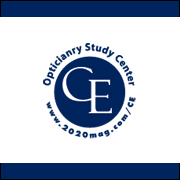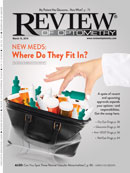Larry Alexander was our friend. We could call him any time and ask a personal or professional question. He never failed to pick up the phone, not even in the middle of a busy day. He was a giant in the profession of optometry, not because of the committees he served on or the papers he wrote or the books he authored, but because he was revered by everybody who knew him. Like Muhammad Ali, Michael Jordan and Wayne Gretzky, he brought out the best in the people he touched and always found a way to make those who were around him better—better doctors and better human beings.
We met Larry early in our careers when we began lecturing at conferences. Larry was a legend then and his textbook, Primary Care of the Posterior Segment, was the quintessential optometric reference on the subject. It had both color and black-and-white photographs, along with magnificent schematic illustrations that clearly depicted the pathophysiology of each entity. It was well written, easy to understand and well referenced, permitting the reader to return to the original references if they wanted additional in-depth information.
Larry was in the audience but didn’t introduce himself until after the program. He was not critical of us novices, but offered compliments and advice on how the talks could be made stronger, and volunteered to assist. He even offered access to his material. Larry proffered his business card and joked that it was like the “Bat Signal” —when called, he would help. He always did.
Larry was fun to be with. He had a great sense of humor and never took himself too seriously. He didn’t suffer fools gladly either. He was forever humble. At a conference just last year, we were sitting together when Larry turned to us during a break and announced that he was going to get refreshments, and asked if he could bring us anything. Imagine—we were forever students in Larry’s shadow, and yet, he we was willing to wait on us. He was, simply put, the nicest man in the world.
Larry was a passionate guy who always took a stand. He was a participant, but you knew how Larry felt about what was being discussed. And he wasn’t easily manipulated. He never shied away from taking the floor and always had a lot to say. Larry might not have been the best, but the best asked him the questions.
When Larry died, we watched as every major player in the profession expressed sadness, grief, disbelief and soul-searching remorse. Dr. Larry Alexander made us all better practitioners, and we are all better people for knowing him. Don McLean wrote the song “American Pie” to celebrate the life of Buddy Holly, proclaiming his death “the day the music died.” To us, Larry Alexander’s passing was the day the ophthalmoscope died. We lost a dear friend, colleague and mentor—a true original in the optometric world.
Joseph W. Sowka, OD, FAAO, Dipl., is a professor of optometry, program supervisor of the Primary Care with Emphasis in Ocular Disease Residency, instructor in glaucoma and retinal disease, and Chair of the Clinical Sciences Department at Nova Southeastern University College of Optometry. At the college’s Eye Care Institute, he is the director of the Glaucoma Service and chief of the Advanced Care Service. Dr. Sowka is a founding member of the Optometric Glaucoma Society, the Optometric Retina Society and the Neuro-ophthalmic Disorders in Optometry Special Interest Group. He is currently the Chair of the Optometric Glaucoma Society Foundation. He is an American Academy of Optometry Diplomate in glaucoma. Dr. Sowka lectures nationally and internationally on topics in ocular disease. He can be reached at (954) 262-1472 or at jsowka@nova.edu.
Andrew S. Gurwood, OD, is a professor of clinical sciences, an attending optometric physician and co-chief in Suite 3 of the Eye Institute of the Pennsylvania College of Optometry at Salus University and a member of the clinical staff of Albert Einstein Medical Center Department of Ophthalmology. He is a founding member of the Optometric Retina Society and a member of the Optometric Glaucoma Society. Dr. Gurwood has lectured and published nationally and internationally on a wide range of subjects in ocular disease. He can be reached at agurwood@salus.edu.
Alan G. Kabat, OD, FAAO, is a professor at the Southern College of Optometry in Memphis, Tenn., where he teaches courses in ocular disease and clinical procedures. He is an attending physician at The Eye Center as well as clinical care consultant at TearWell Advanced Dry Eye Treatment Center. A recognized expert in the area of ocular surface disease, Dr. Kabat is a founding member of both the Optometric Dry Eye Society and the Ocular Surface Society of Optometry. He is also associate clinical editor of Review of Optometry. He can be reached at (901) 252-3691 or at alan.kabat@alankabat.com.
The authors have no direct financial interest in any product mentioned in this publication.
Additional Publications
-
Annual Contact Lenses and Lens Care Guide-2022
Hear from several experts, including Miguel A. Busquets, MD, Carolyn Majcher, OD, and Mary Anne C. Murphy, OD, about how to manage geographic atrophy using modern-day tools, technology, treatments and knowledge.
Sponsored by Apellis Pharmaceuticals Inc and Carl Zeiss Meditec USA, Inc Clinical Perspectives on Patient Care
Digital Devices are Impacting Your Patients
Opthalmic Product Guide
Practical Matters in Myopia Management
Innovations in Glaucoma Care & Treatment



